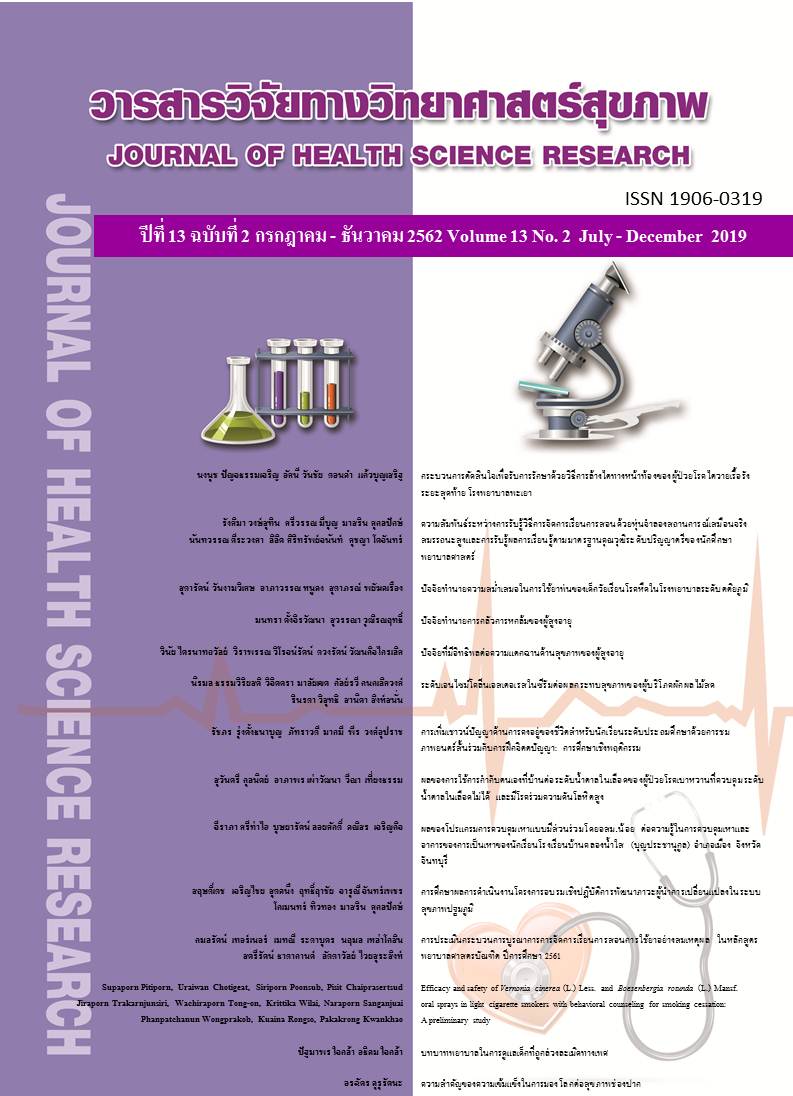ปัจจัยที่มีอิทธิพลต่อความแตกฉานด้านสุขภาพของผู้สูงอายุ
Main Article Content
บทคัดย่อ
ความแตกฉานด้านสุขภาพของผู้สูงอายุเป็นทักษะสำคัญ เพื่อให้เกิดพฤติกรรมสุขภาพที่เหมาะสม เป็นแนวทางในการลดปัจจัยเสี่ยงด้านสุขภาพ และส่งเสริมคุณภาพชีวิต การวิจัยครั้งนี้ศึกษาปัจจัยเชิงทำนายระหว่างโรคร่วม แรงสนับสนุนจากครอบครัว พฤติกรรมการสืบค้นข้อมูลสุขภาพจากสื่อออนไลน์/สื่อสังคมกับความแตกฉานด้านสุขภาพของผู้สูงอายุ คัดเลือกกลุ่มตัวอย่างแบบเจาะจง เป็นผู้มีอายุ 60 ปีขึ้นไป ในชุมชนจังหวัดนนทบุรี จำนวน 148 คน เก็บข้อมูลโดยสัมภาษณ์ แบบทดสอบความฉลาดด้านสุขภาพของผู้สูงอายุ แบบบันทึกโรคร่วม แบบสอบถามความพึงพอใจต่อแรงสนับสนุนจากครอบครัว และแบบประเมินพฤติกรรมการสืบค้นข้อมูลสุขภาพจากสื่อออนไลน์/สื่อสังคม โดยมีค่าสัมประสิทธิ์แอลฟาครอนบาค .70, .90, .91 และ .96 ตามลำดับ วิเคราะห์ข้อมูลโดยใช้สถิติเชิงพรรณนา และสัมประสิทธิ์ถดถอยพหุคูณ
ผลการวิจัยพบว่า กลุ่มตัวอย่างมีระดับความแตกฉานด้านสุขภาพในระดับพื้นฐานสูง (= 46.85, SD = 7.76 ) แรงสนับสนุนจากครอบครัว (r = .227, p < 0.01, β = .145, p < .05) และพฤติกรรมการสืบค้นข้อมูลสุขภาพจากสื่อออนไลน์/สื่อสังคม (r = .631, p < 0.01, β = .599, p < .001) มีความสัมพันธ์และสามารถร่วมกันอธิบายความแปรปรวนความแตกฉานด้านสุขภาพของผู้สูงอายุได้อย่างมีนัยสำคัญทางสถิติ ร้อยละ 40.60 (p < .001) แต่โรคร่วมไม่มีความสัมพันธ์และไม่สามารถร่วมทำนายความแตกฉานด้านสุขภาพของผู้สูงอายุได้
ข้อเสนอแนะ พยาบาลและทีมสุขภาพควรสนับสนุนให้ครอบครัวมีสัมพันธภาพที่ดีและส่งเสริมให้ผู้สูงอายุมีการสืบค้นข้อมูลสุขภาพจากสื่อออนไลน์/สื่อสังคม
Downloads
Article Details
บทความที่ได้รับการตีพิมพ์เป็นลิขสิทธิ์ของวิทยาลัยพยาบาลบรมราชชนนี จังหวัดนนทบุรี
ข้อความที่ปรากฏในบทความแต่ละเรื่องในวารสารวิชาการเล่มนี้เป็นความคิดเห็นส่วนตัวของผู้เขียนแต่ละท่านไม่เกี่ยวข้องกับวิทยาลัยพยาบาลบรมราชชนนี จังหวัดนนทบุรี และคณาจารย์ท่านอื่น ในวิทยาลัยฯ แต่อย่างใด ความรับผิดชอบองค์ประกอบทั้งหมดของบทความแต่ละเรื่องเป็นของผู้เขียนแต่ละท่าน หากมีความผิดพลาดใด ๆ ผู้เขียนแต่ละท่านจะรับผิดชอบบทความของตนเองแต่ผู้เดียว
เอกสารอ้างอิง
2. Yong-Bing L, Liu L. Relationship between health literacy, health-related behaviors and health status: A survey of elderly chinese. Int J Environ Res Public Health. 2015; 12(8): 9714-25.
3. National Statistical Office Ministry of Information and Communication Technology. The 2014 survey of the older persons in Thailand. Bangkok: Text and Journal Publication; 2014.
4. Ervin T, Genc B, Naim, J, Kristine S, Naser R, Bajram, H, et al. Health literacy, self-perceived health and self-reported chronic morbidity among older people in Kosovo. Health Promot Int. 2014; 30:667-74.
5. Cho IY, Lee DS, Arozullah MA, Crittenden SK. Effects of health literacy on health status and health service utilization amongst the elderly. Soc Sci Med. 2008; 66(8): 1809-16.
6. Ginggeaw S, Prasertsri N. The relationship between health literacy and health behaviors among older adults who have multi-morbidity. Nursing Journal of the Ministry of Public Health. 2013; 25: 43-54. (in Thai).
7. Giovannetti ER, Wolff JL, Xue QL, Weiss CO, Leff B, Boult C, et al. Difficulty assisting with health care tasks among caregivers of multimorbid older adults. J Gen Intern Med. 2012; 27(1): 37-44.
8. Samuel GS, Laura MC, Jane W, Christian VW, Michael SW. Skill set or mild set? Associations between health literacy, patient activation and health. PLoS One. 2013; 8(9): e74373.
9. Sudore LR, Yeffe K, Satterfield S, Harris BT, Mehta, MK, Simonsick ME, et al. Limited literacy and mortality in the elderly; The health, aging, and body composition study. J Gen Intern Med. 2006; 21(8): 806-12.
10. Foundation of Thai Gerontology Research and Development Institute. Situation of the Thai elderly 2016. Bangkok: Printery Publication; 2016. (in Thai).
11. Tawonwadcharakul B. Factors related to family support for elder persons with osteoarthritis, Upper southern region. [Thesis]. Bangkok: Chulalongkorn University; 2009. (in Thai).
12. Maria P, Suzanne MS, Mark H, Kelly H, Amy B, David R. Effect of health literacy on the quality of life of older patients with long-term conditions: A large cohort study in UK general practice. Qual Life Res. 2018; 27(5): 1257–68.
13. Loipha S. The Elderly and Information Technology. Journal of Information Science. 2010; 29: 53-64. (in Thai).
14. Siriwongpakhon S. A study of media exposure behavior to relation with elderly of self-reliance in Bangkok metropolis. [Thesis]. Bangkok: Rajamangala University of Technology Phra Nakhon; 2013. (in Thai).
15. Kutner M, Greenberg E, Jin Y, Paulsen C. The health literacy of America’s adults: Results from the 2003 National Assessment of Adult Literacy. 2006. [cited 2018 Sep 9]; Available from: https://nces.ed.gov/pubsearh/pubsinfo.asp?pubid=2006483.
16. Smith CH, Boland B, Daureeawoo Y, Donaldson E, Small K, Tuomainen J. Effect of aging on stimulated salivary flow in adults. J Am Geriatr Soc. 2013; 61(5): 805-8.
17. Train the Brain Forum Committee. Thai mental state examination. Siriraj Hosp Gaz. 1993; 45: 359-74. (in Thai).
18. Nilnate W, Hengpraprom S, Hanvoravongchai P. Level of health literacy in Thai elders, Bangkok, Thailand. Journal of Health Research. 2016; 30: 315-21. (in Thai).
19. Charlson ME, Pompei P, Ales KL, MacKenzie CR. A new method of classifying prognostic comorbidity in longitudinal studies: development and validation. J Chron Dis. 1987; 40(5): 373-83.
20. Malathum, P. A model of factors contributing to perceived abilities for health-promoting self-care of community-dwelling Thai older adults. [Thesis]. USA: University of Texas at Austin; 2001. (in Thai).
21. Tipkanjanaraykha K, Yingrengreung S, Kheokao J, Ubolwan K, Jaemtim N, Promsuan W. Health information seeking behaviors of elderly through online media According to perceived health status. Journal of health science research. 2017;11:12-22. (in Thai).
22. Wolf SM, Gazmararian AJ, Baker DW. Health literacy and functional health status among older adults. Arch Intern Med. 2005; 165: 1946-52.
23. Stewart WD, Reitzel RL, Correa-Ferna´ndez V, Cano AM, Adams EC, Cao Y, et al. Social support mediates the association of health literacy and depression among racially/ethnically diverse smokers with low socioeconomic status. J Behav Med. 2014; 37(6): 1169-79.
24. McCleary-Jones V, Scheideman-Miller CA, Johnson B, Overall M, Dwyer K. Health information technology use and health literacy among community-dwelling African Americans. ABNF J. 2013; 24(1): 10-6.


